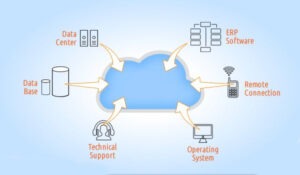Why the Right E-Commerce Cloud Solution Matters
The right e-commerce cloud solution can be a game changer, transforming your business and positioning it for sustainable, long-term success. As global e-commerce sales are expected to skyrocket to an impressive $6 trillion by 2025, the demand for platforms that are not only scalable, but also reliable and efficient, has reached an all-time high. In such a dynamic and fiercely competitive market, selecting the right cloud solution is far more than a technological choice, it’s a strategic investment that lays the groundwork for operational excellence, boosts customer satisfaction, and unlocks new avenues for growth and innovation.
An effective cloud solution doesn’t just support your current needs; it prepares your business to thrive in the future by adapting to market shifts, scaling effortlessly as you grow, and delivering the seamless experiences today’s consumers demand. For e-commerce entrepreneurs, the decision to adopt the right cloud platform can be the key to standing out, exceeding customer expectations, and establishing a strong foothold in an ever-evolving industry.
Based on my extensive experience with various e-commerce cloud solutions, these actionable insights, practical advice, and top recommendations to help you select the platform that aligns with your business’s unique needs and growth ambitions.
Understanding E-commerce Cloud Solutions

At its core, an e-commerce cloud solution provides businesses with the infrastructure, tools, and resources needed to run online stores. Unlike traditional on premises solutions, cloud platforms offer flexibility, scalability, and cost-efficiency, all crucial in a dynamic market where customer expectations evolve rapidly.
From hosting your website to managing your inventory and ensuring secure payment processing, the right cloud solution serves as the backbone of your online operations. But not all cloud platforms are created equal. Factors like performance, security, and integrations can vary widely, making it essential to choose wisely.
Our journey with various e-commerce cloud platforms has been enlightening. We’ve encountered robust systems that transformed businesses and others that left much to be desired. Here’s what our experience has taught us:
- Scalability is Key: Businesses often underestimate their growth potential. A scalable cloud solution ensures you’re prepared to handle traffic surges during peak seasons, such as Black Friday or holiday sales.
- Integration Matters: Your e-commerce platform should integrate seamlessly with third-party tools like CRMs, email marketing software, and analytics platforms. This connectivity simplifies operations and provides a unified view of your business.
- Security Can’t Be Compromised: With cyber threats on the rise, robust security measures like data encryption, two-factor authentication, and regular security updates are non-negotiable.
Through trial and error, we’ve identified a few standout e-commerce cloud solutions. Here are our top picks:
- Shopify Plus: Known for its user-friendly interface, Shopify Plus offers unparalleled ease of use and a suite of powerful tools for scaling businesses. It’s particularly well-suited for small to medium-sized enterprises looking for a plug-and-play solution.
- Magento (Adobe Commerce): For businesses requiring more customization, Magento Commerce is a robust option. Its open-source framework allows for extensive modifications, though it’s best suited for those with a dedicated development team.
- AWS for E-commerce: Amazon Web Services (AWS) provides unmatched flexibility and scalability for larger businesses with complex needs. However, it requires a higher degree of technical expertise.
How to Choose the Right E-Commerce Cloud Solution

When choosing the ideal e-commerce cloud solution for your business, consider the following best practices:
- Assess Your Needs: Start by identifying your business’s unique requirements. Are you focusing on rapid growth, international expansion, or enhanced customer experience? Your goals will determine which solution aligns best.
- Prioritize Performance: A slow-loading website can deter customers and harm conversions. Ensure your chosen platform delivers fast loading times, even during high-traffic periods.
- Evaluate Total Cost of Ownership (TCO): While initial pricing is important, don’t overlook hidden costs like transaction fees, app integrations, and custom development. A comprehensive TCO analysis will prevent unpleasant surprises down the road.
- Look for Robust Support: Reliable customer support can be a lifesaver when technical issues arise. Opt for a platform with responsive and knowledgeable support teams available 24/7.
- Future-Proof Your Choice: Technology evolves rapidly. Choose a solution with a proven track record of innovation and regular updates to stay ahead of the curve.
Real-World Example: Scalable Solution Transition
One of our clients, a mid-sized fashion retailer, initially relied on an on premises platform. As their business expanded, they struggled with slow loading times and limited integration capabilities. Transitioning to Shopify Plus not only resolved these issues but also enabled them to scale seamlessly during peak sales events. Within six months, they saw a 30% increase in revenue, attributed largely to the improved performance and user experience.
The Future of E-commerce Cloud Solutions
As technology continues to advance, the future of e-commerce cloud solutions is set to become even more exciting. Emerging trends like AI-driven personalization, headless commerce, and enhanced data analytics are reshaping the landscape.
For example, AI-powered tools can analyze customer behavior to deliver personalized shopping experiences, boosting engagement and conversions. Similarly, headless commerce allows for greater flexibility by decoupling the front-end presentation layer from the back-end functionality, enabling faster and more creative website updates.
Final Takeaways
Selecting the right e-commerce cloud solution can be a game-changer for your business. From ensuring scalability to enhancing customer experience, the benefits are undeniable. Our experience has shown that platforms like Shopify Plus, Magento, and AWS are reliable choices, each catering to specific business needs.
By prioritizing scalability, performance, and integration capabilities, you position your business for success in a competitive market. The right solution isn’t just about meeting today’s needs, but preparing for tomorrow’s challenges and opportunities.
We hope our insights and recommendations help guide you toward the best choice for your e-commerce journey. If you’re exploring e-commerce cloud solutions or have experiences to share, we’d love to hear from you! Reach out to Frontlevels, your trusted e-commerce development partner, and let’s discuss how we can support your growth.

